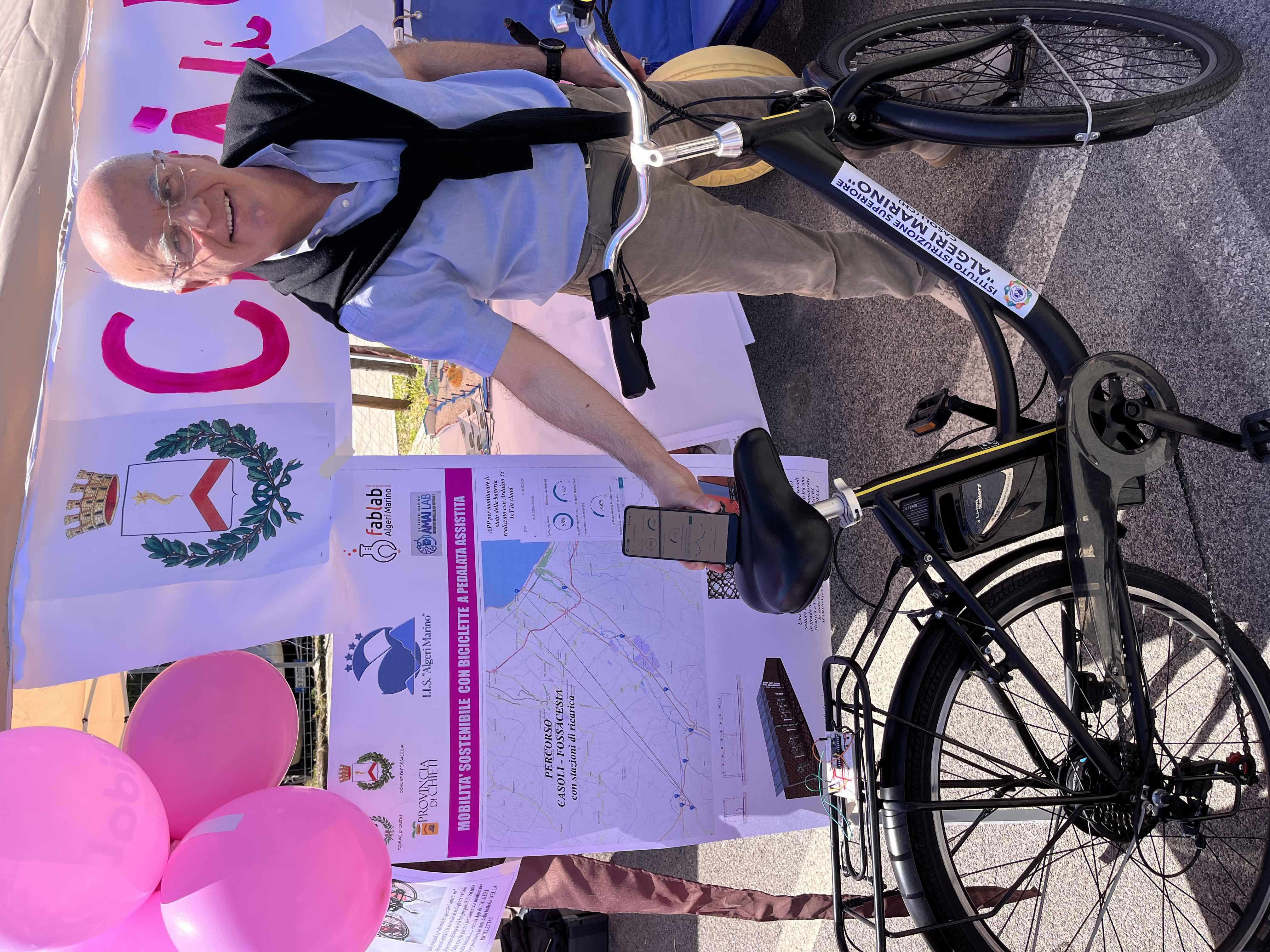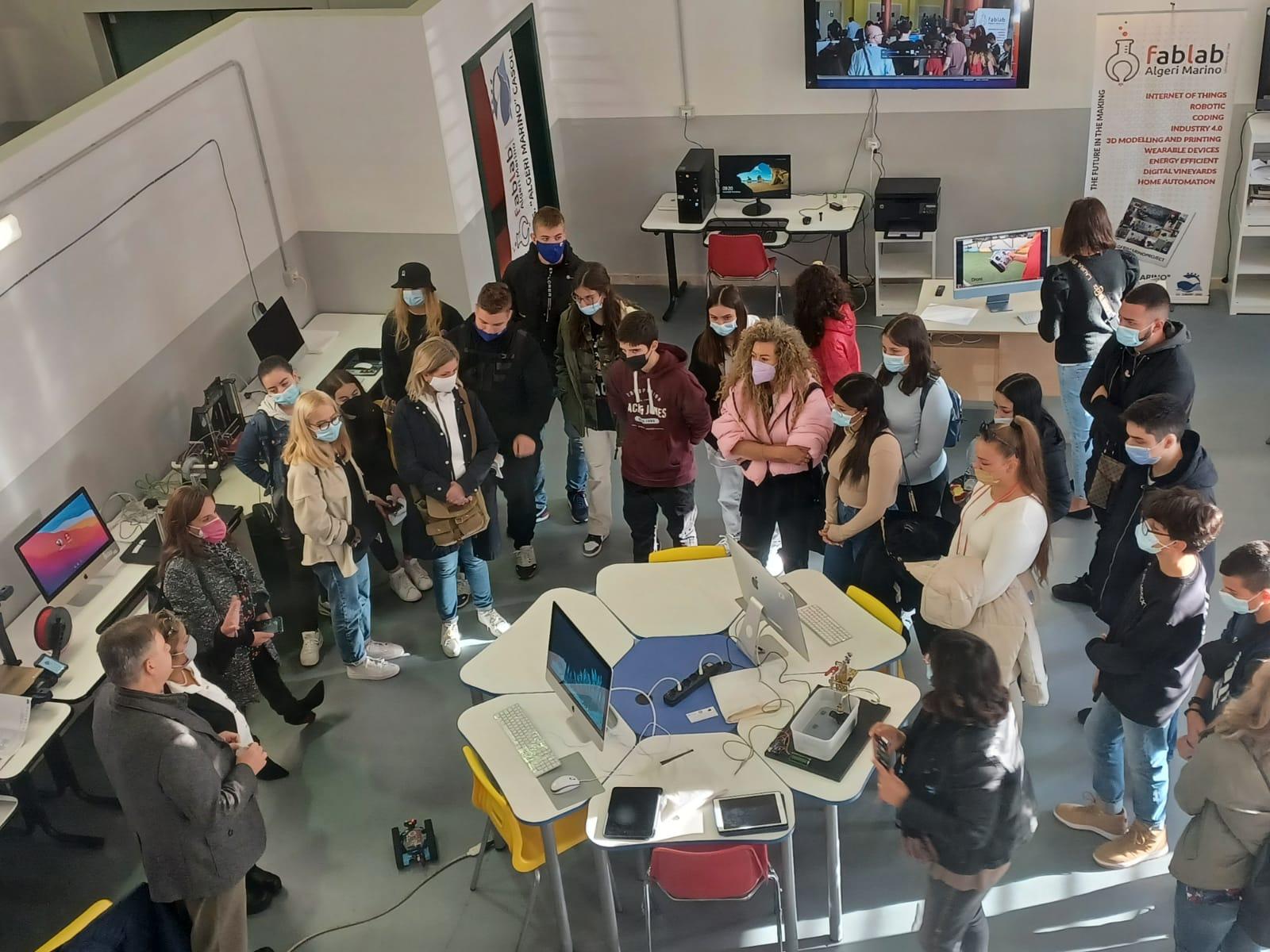Exhibitors 2023
- ART
- ARTISANS & NEW CRAFT
- FASHION & WEARABLES
- RECYCLING & UPCYCLING
- STEAM PUNK
- CIRCULAR ECONOMY
- PRODUCT DESIGN
- STARTUP
- BIOLOGY
- EDUCATION
- MUSIC & SOUND
- SCIENCE
- GAMES
- HACKS
- INTERNET OF THINGS
- OPEN SOURCE
- HOME AUTOMATION
- FABRICATION
- NEW MANUFACTURING
- ROBOTICS
- INDUSTRIAL AUTOMATION
- 3D PRINTING
- ENERGY & SUSTAINABILITY
- YOUNG MAKERS (< 18)
- WELLNESS & HEALTHCARE
- AEROSPACE
- FOOD & AGRICULTURE
- 3D SCANNING
- ARTIFICIAL INTELLIGENCE
- DRONES
- KIDS & EDUCATION
- CULTURAL HERITAGE
- RETROCOMPUTING
- VIRTUAL REALITY
- CYBERSECURITY
Algeri-bike
Battery status monitoring of an electric bike made with Arduino 33 loT via smatphone.
Fablab Algeri Marino Casoli (CH)
From a place that has been abandoned for years, a creative space has been born where teaching and technology have come together to generate new intelligent products. Students attend the “Algeri Marino” Fablab – Laboratory of ideas for learning, sharing, collaborating, producing and prototyping almost any object in unexpected times and spaces. The types of work that are carried out in this "inventor's workshop" have to do first of all with education, training, the use of equipment (supported or independently), planning and teamwork.
Over time, every innovation activity has passed through the Fablab: from an initial Arduino board, all the topics of the internet of things, digital manufacturing, rapid prototyping, robotics, drones, wearable devices, and even seminars have been addressed , conferences and events with local realities and Universities.
In May 2015, the first “Algiers Marino drone show” took place at the nearby sports field.
The opening to the public, which took place with the first "Fablab day", dating back to February 2016, allowed all visitors to observe with their own eyes applications that use 3D printing and scanning, Arduino, Raspberry and iPad. On that occasion, the students showed an intrigued audience the drink maker, a machine for preparing any drink controlled by a smartphone and a presence detector with click and acquisition of the image to be sent on the Telegram network. Participation in the Santa Reparata di Casoli fair in October 2016 showed the local population the results of an entire year of activity.
Relations with the Faculty of Engineering of the University of L'Aquila were constant, especially with Eng. Francesco Tarquini for the development of Apps for iOS, with Eng. Francesco Valentini on networking, with dr. Francesco Vernacotola on 3D modeling and printing and the engineers Fabio Graziosi and Fortunato Santucci who held seminars at our Institute on the new organizations of cities in a smart key.
During the last seminar, entitled "Beyond the smart home", agreements were stipulated both with the Faculty of Architecture of Pescara and with that of Engineering of Pisa, to collaborate on the development of home automation applications as part of the "Solar Decathlon 2018 ” which will be held in Dubai.
The Fablab made its technological and digital innovation products known by participating in the month of October 2016 at the "Maker Faire" in Capua and in May 2017 at the "Edu Day" in L'Aquila, exhibiting applications of robotics and innovation in agriculture with the "Digital Vineyard" start-up, already awarded in L'Aquila on the occasion of the "European Researchers' Night" on 30 September 2016. In October 2016, at the "Maker Faire" in Rome, the Fablab activities were brought, with great emotion, to the knowledge of the creator of the first Fablab, prof. Neil Gershenfeld, American academic, professor at the Massachusetts Institute of Technology and director of the Center for Bits and Atom, and of the inventor of the Arduino board, Massimo Banzi.
To the great satisfaction of the Algeri Marino students, in 2016 the "Internet baby car" project arrived among the 100 finalists to represent the Italian IoT in Shenzhen and in 2017 the first awards arrived: 5th place in the ranking for schools and 11th place overall in the Robocup Junior competitions of the Rescue Line competition held in Pescara. On May 17, for the first time in the history of our Institute, the project of a PLC controlled with an iPhone, developed in the Fablab by students Andrea Spinelli and Nico Rossi, obtained 5th place at the National Automation Olympics in Piacenza organized from Siemens. The students were enthusiastic about the results achieved and are convinced that they can do even more.
In addition to all this, the Fablab is also a Community, that is the desire to belong to a group, not necessarily linked to a physical space; is an online community, anyone can participate wherever they are with a simple access to the networks, leaving messages on forums; even after the qualification or diploma, anyone who has already entered the world of work is absolutely free to continue or undertake a new project. In fact, within virtual communities, real social spaces are simulated, in which knowledge and knowledge are produced, disseminated and exchanged even at a distance of thousands of kilometers.




















































































